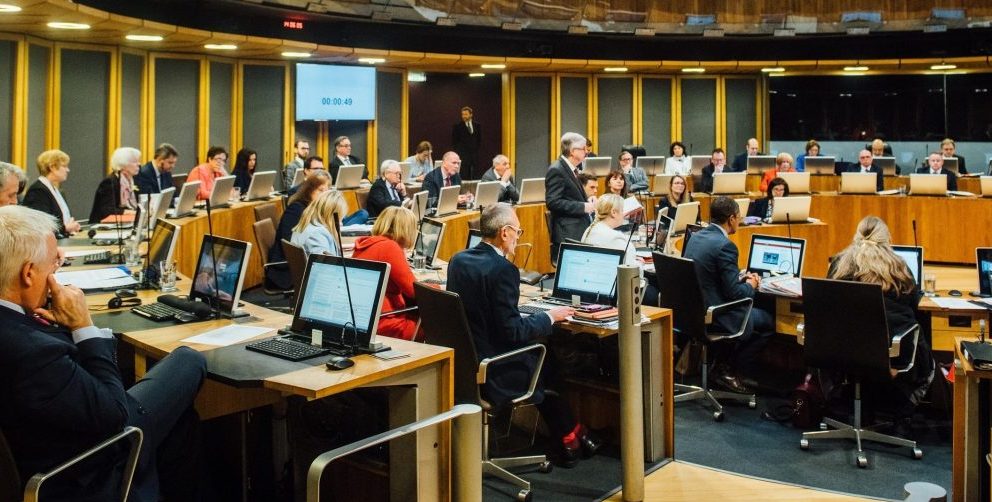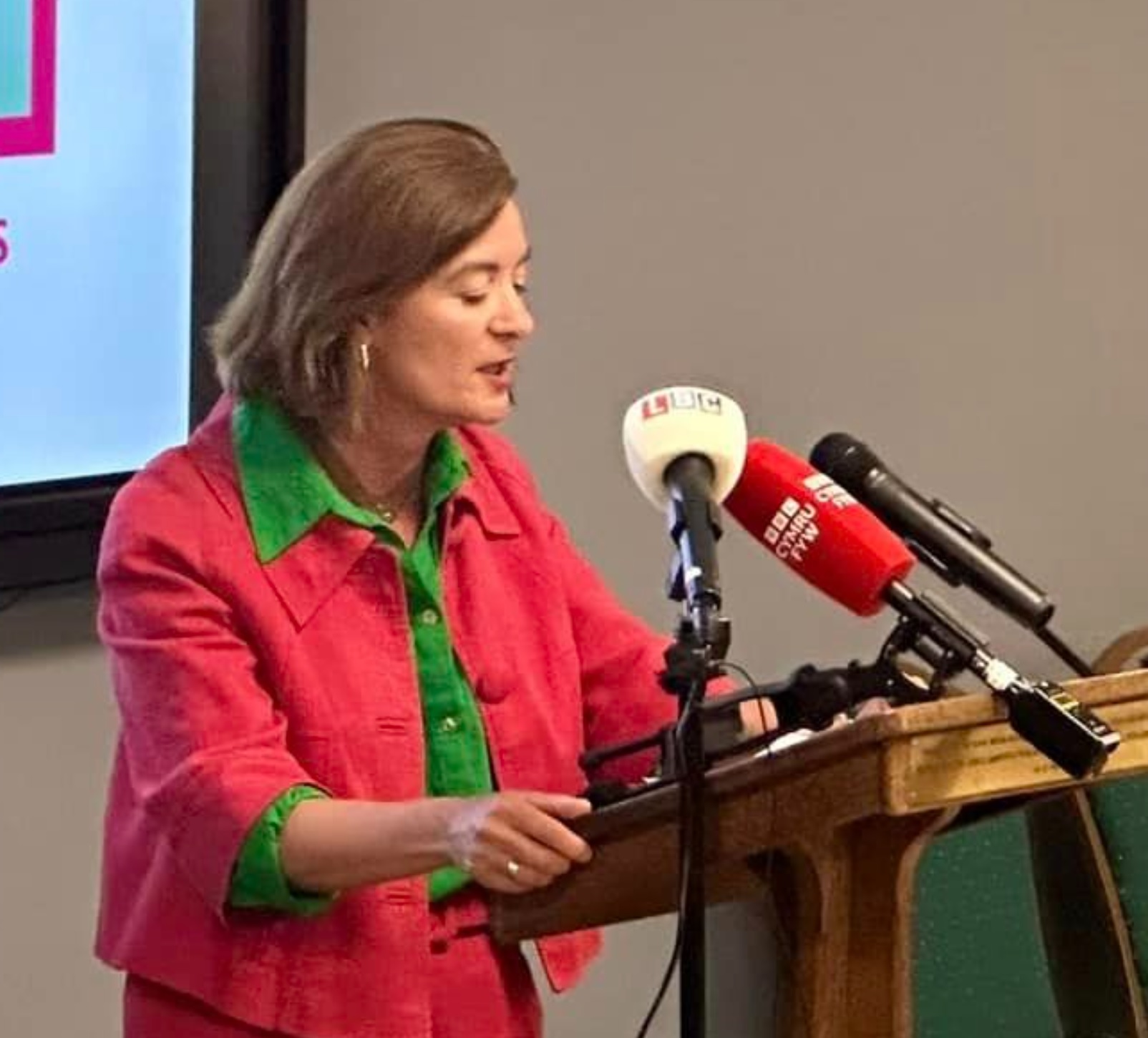News
Concerns over access to hearing services in Wales

CONCERNS have been raised about access to hearing services, with statistics showing the number of people on waiting lists for a hearing aid has ballooned by 150% in three years.
Janet Finch-Saunders told the Senedd that 527,100 adults – 17% of Wales’ population – have a degree of hearing loss that would benefit from treatment such as hearing aids.
She said that 4,000 people were waiting for a hearing aid appointment three years ago but by September 2023 that number had reached nearly 10,000.
Highlighting that Wales has the highest proportion of over-65s of any UK nation, she told the chamber it is imperative to develop the best hearing services possible.
She explained that incidence increases by about 1% per year of age, so 80% of 80-year-olds and 90% of 90-year-olds will have hearing loss.
The Aberconwy MS raised concerns about a “postcode lottery” in terms of waiting times.
She said only one patient waited longer than 14 weeks in Swansea, 583 in Hywel Dda and a staggering 1,674 in the Betsi Cadwaladr University Health Board area.
Ms Finch-Saunders pointed out there is also an inconsistent spread of audiologists employed by health boards with five in Powys and 65 in Betsi Cadwaladr.
Calling for greater collaboration with independent providers such as Boots and Specsavers, she argued it would help health boards add capacity and improve access.
She said the model, which is in use in England and Ireland, has provided services at a third of the per-patient cost compared to hospital services.
Ms Finch-Saunders highlighted that the National Deaf Children’s Society (NDCS) found that 26% of families were dissatisfied with waiting times for paediatric audiology.
She told MSs: “Health needs to work with education, which has seen a 17% reduction in teachers of the deaf in Wales since 2011.”
Ms Finch-Saunders added that NDCS has found that some children are being denied individual development plans under Wales’ new additional learning needs system.
She warned: “Hearing loss cuts people off from each other. This can increase the risk of social isolation, cognitive decline and other mental issues.
“And I’m given to understand that it can actually bring on early dementia and Alzheimer’s.
“Too often, deaf people who simply cannot hear quite often feel that they are referred to as ‘daft’ people – and that’s the stigma that we’ve got to get rid of.”
Mark Isherwood, who lost his hearing as a younger person, urged ministers to recognise that demand for audiology services is only going to increase.
He echoed calls for the NHS to work with community audiology service providers.
Natasha Asghar, a fellow Conservative, who represents South Wales East, highlighted a Senedd event on adult age-related hearing loss that she sponsored on Tuesday.
Joel James, who spoke about his own experiences of hearing loss at the event, said hearing impairment is linked to cognitive decline but when aids are fitted, it ceases immediately.
He said: “If we look at child development, we know of social isolation, the impact in terms of speech and language, and then also the social skills that can be impaired.
“And then if we look at when we become adults, in terms of the working environment, there are 4.4 million in the entire UK that have hearing difficulties.
“Many of them feel that they’re being discriminated against in the working environment.”
Russell George, the Conservatives’ shadow health minister, emphasised the need for early intervention and diagnosis, saying it can bring a saving down the line.
Responding to the short debate on February 7, Eluned Morgan recognised that hearing loss can be devastating at any age and can leave people feeling isolated.
The health minister said audiology services are delivered differently from the rest of the UK, arguing there is a stronger emphasis on primary and community care than elsewhere.
Baroness Morgan said she does not have any principled objection to exploring private sector options but the Welsh Government will prioritise public sector provision.
“If they can’t do it, then, obviously, let’s look at alternatives,” she told the chamber.
“But I would like to give this a fair wind, and I guess the health boards are on notice that they’ve got to deliver on what we’re asking them to deliver.”
She added: “Let’s stick to the plan, and, if they don’t deliver, then there’ll be ructions.”
News
Paris in February made easy with special direct Air France flights from Cardiff

TRAVELLING to Paris has never been simpler for Welsh holidaymakers, with Air France launching a series of special direct weekend services from Cardiff Airport to the French capital this month.
The limited-period flights offer a convenient, non-stop journey of under two hours to Paris, giving passengers more time to enjoy the city’s culture, cuisine and famous landmarks without the hassle of connections or long road transfers to other UK airports.

Timed perfectly for winter city breaks and Valentine’s getaways, the services run between February 13 and February 16, making them ideal for long weekends.
February is widely considered one of the best times to visit the French capital, with fewer crowds and a relaxed, romantic atmosphere. Visitors can explore world-famous attractions including the Eiffel Tower, the Arc de Triomphe and Notre-Dame Cathedral, browse galleries at the Louvre and Musée d’Orsay, or simply enjoy cafés, bistros and Michelin-starred dining across the city.
With Valentine’s Day falling during the operating period, the flights offer couples an easy escape for scenic walks along the Seine, memorable meals and classic Parisian experiences.
Jon Bridge, CEO of Cardiff Airport, said: “We’re delighted to offer direct flights to such a vibrant city for Valentine’s weekend. Cardiff Airport is expanding its reach, giving customers an easy, friendly travel experience and fantastic options. We’ve listened to passenger demand and are excited to make this opportunity possible, with more to come from Cardiff.”
Seats are available now via airfrance.co.uk and through travel agents. As availability is limited, early booking is recommended.
Flight schedule
Cardiff (CWL) to Paris (CDG)
• Feb 13 – AF4149 – 6:20pm → 8:50pm
• Feb 14 – AF4149 – 3:20pm → 5:50pm
• Feb 15 – AF4149 – 9:20am → 11:50am
• Feb 15 – AF4151 – 9:00pm → 11:30pm
• Feb 16 – AF4149 – 9:20am → 11:50am
• Feb 16 – AF4151 – 5:50pm → 8:20pm
Paris (CDG) to Cardiff (CWL)
• Feb 13 – AF4148 – 5:00pm → 5:30pm
• Feb 14 – AF4148 – 2:00pm → 2:30pm
• Feb 15 – AF4148 – 8:00am → 8:30am
• Feb 15 – AF4150 – 7:40pm → 8:10pm
• Feb 16 – AF4148 – 8:00am → 8:30am
• Feb 16 – AF4150 – 4:30pm → 5:00pm
Education
Language commissioner launches probe into school closure impact on Welsh

THE WELSH Language Commissioner has launched a formal investigation into claims that the proposed closure of a rural Carmarthenshire primary school did not properly assess the impact on the Welsh language.
Campaign group Cymdeithas yr Iaith confirmed this week that the Welsh Language Commissioner will examine whether Carmarthenshire County Council complied with its legal duties when producing a language impact assessment linked to plans to close Ysgol Llansteffan.
The council issued a statutory notice last year proposing to shut the village school at the end of the summer term as part of wider education reorganisation. A final decision had been expected this spring.
However, the investigation now creates fresh uncertainty over the timetable.

Complaint over ‘insufficient assessment’
Cymdeithas yr Iaith says it submitted a formal complaint arguing that the council failed to produce a sufficiently detailed assessment of how the closure could affect Welsh-medium education and the wider Welsh-speaking community.
The group claims the authority selectively used data to support closure rather than examining all available evidence objectively.
Two key concerns were raised.
Firstly, campaigners argue there may not be enough places in neighbouring Welsh-medium schools to accommodate pupils from Llansteffan and nearby housing developments, potentially forcing some families into English-medium provision.
Secondly, they say the assessment did not meaningfully consider the school’s role as a community hub or explore ways the site could generate income and support local Welsh-language activities.
On behalf of local members, Ffred Ffransis said: “There will not be places for all the Llansteffan children, nor for the children of the new housing estates, in other Welsh-medium schools in the area.
“The most cost-effective way of providing sufficient places locally in Welsh-medium education is by keeping open Ysgol Llansteffan and making better use of the buildings, including environmental education and community use.”
Formal investigation
In a letter to the group, the commissioner confirmed an investigation will be held under Section 71 of the Welsh Language Measure to determine whether the council complied with Welsh language standards.
The probe could take up to three months.
Campaigners believe this may delay implementation of the closure and could require the council to revisit its assessment and potentially carry out a fresh statutory consultation.
Ffransis said: “Even if the council now decided to make a full and meaningful assessment, there would likely have to be a new consultation. The original decision may have been taken on a faulty basis.”
He added that similar concerns had been raised about language impact assessments connected to other proposed school closures in the county.
Council position
The council has previously said that school reorganisation proposals are driven by falling pupil numbers, financial pressures and the need to ensure sustainable, high-quality education.
Authorities across Wales have faced difficult decisions in recent years as rural rolls decline and building maintenance costs rise.
It is expected the council will respond formally to the commissioner’s investigation in due course.
What happens next
If the commissioner finds that language standards were not properly followed, enforcement steps could be taken and the process delayed or revisited.
For families in Llansteffan, the outcome may determine whether their local Welsh-medium school remains open beyond the summer term.
The Herald has contacted Carmarthenshire County Council for comment.
Further updates will follow as the investigation progresses.
Business
First Minister criticised after ‘Netflix’ comment on struggling high streets

Government announces 15% support package but campaigners say costs still crushing hospitality
PUBS, cafés and restaurants across Wales will receive extra business rates relief — but ministers are facing criticism after comments suggesting people staying home watching Netflix are partly to blame for struggling high streets.
The Welsh Government has announced a 15% business rates discount for around 4,400 hospitality businesses in 2026-27, backed by up to £8 million in funding.
Announcing the package, Welsh Government Finance Secretary Mark Drakeford said: “Pubs, restaurants, cafés, bars, and live music venues are at the heart of communities across Wales. We know they are facing real pressures, from rising costs to changing consumer habits.
“This additional support will help around 4,400 businesses as they adapt to these challenges.”
The announcement came hours after Eluned Morgan suggested in Senedd discussions that changing lifestyles — including more time spent at home on streaming services — were contributing to falling footfall in town centres.
The remarks prompted political backlash.
Leader of the Welsh Liberal Democrats, Jane Dodds, said: “People are not willingly choosing Netflix over the high street. They are being forced indoors because prices keep rising and wages are not.
“Blaming people for staying at home is an insult to business owners who are working longer hours just to survive.”
Industry groups say the problem runs deeper than consumer behaviour.
The Campaign for Real Ale (CAMRA) welcomed the discount but warned it would not prevent closures.
Chris Charters, CAMRA Wales director, said: “15% off for a year is only the start. It won’t fix the unfair business rates system our pubs are being crushed by.
“Welsh publicans need a permanent solution, or doors will continue to close.”
Across Pembrokeshire, traders have repeatedly told The Herald that rising energy bills, wage pressures and rates — rather than a lack of willingness to go out — are keeping customers away.
Several town centres have seen growing numbers of empty units over the past year, with independent shops and hospitality venues reporting reduced footfall outside the main tourist season.
While ministers say the relief balances support with tight public finances, business groups are calling for wider and longer-term reform.
Further debate on rates changes is expected later this year.

-

 Health6 days ago
Health6 days agoConsultation reveals lack of public trust in health board
-

 Community7 days ago
Community7 days agoPembrokeshire students speak at national Holocaust Memorial Day event
-

 News24 hours ago
News24 hours agoPrincess of Wales visits historic Pembrokeshire woollen mill
-

 News7 days ago
News7 days agoKurtz raises Gumfreston flooding in the Senedd as petition deadline nears
-

 Crime5 days ago
Crime5 days agoPembroke man accused of child sex offences sent to Swansea Crown Court
-

 Education7 days ago
Education7 days ago‘Vulnerable teen’ questioned by police at Milford Haven School
-

 Education7 days ago
Education7 days agoAttendance concerns at Milford School reflect wider issue raised at the Senedd
-

 Health3 days ago
Health3 days agoDoctor struck off after sexual misconduct findings at Withybush Hospital



























